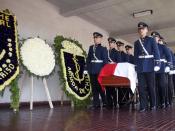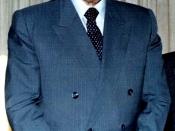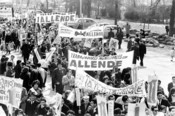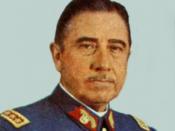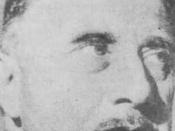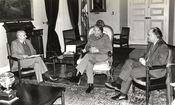ChileFrom 1973 - 1977, there was genocide in Chile. The targets were people who believed in the communist government system. The start of it all began on September 11th, 1973 when Chilean commander in chief, Augusto Pinochet Ugarte commanded the Chilean army and police force to overthrow the current president Salvador Allende. The main reason for the overthrow was because of Allende's economic plan. With it, inflation was rising 1% every day. The only reason the coup was successful at overthrowing the government was because America backed them. With Pinochet in power, his army removed everyone who they deemed the remotest rick to his new military junta. He is accused of devising the worst concentration camp regime since Hitler's grand plan. By the end of 1973, more than 250,000 Chileans were detained in these prisons.
The genocide in Chile began a few years after the 1970 election. The election though, was a contributor to the genocide about to happen in a few years.
At the end of the three way election, Salvador Allende had the most votes, but not majority. Even though more than 2/3 of the voters opposed him, he was still expected to win. So, it was up to congress to choose the winner, and of course they didn't listen to the people and chose Allende because he had the most votes. U.S president at the time, Richard Nixon, feared that Allende might convert Chile into a bastion of Marxism. So, without informing our ambassador to Chile at the time, he encouraged the CIA to prevent Allende's inauguration. One plan called for the United States to bribe the Christian Democratic legislators into voting for Jorge Alessandri, the man who had placed second in the 1970 election. Alessandri had promised that if elected, he would resign, allowing the outgoing president, Eduardo Frei, to seek office again. Frei, fearing that Allende's followers might rebel if their candidate did not take office, refused. Now with Allende president, the economy of Chile collapsed.
Allende's economic policies were some of the worst in history. He increased people's wages while freezing prices. This caused massive inflation. When his followers, in contravention of existing laws, seized farm and urban land in addition to factories, both agricultural and industrial productivity plummeted. After the U.S.-owned copper mines were nationalized, without compensation, the United States reduced its economic assistance while trying to prevent Chile from borrowing money from international banks. Allende, however, easily found other nations willing to lend him funds. By 1973, inflation in Chile was rising 1% every day. Meanwhile, strikes and even more seizures of property and factories paralyzed the economy. The opposition could do nothing: Allende's party possessed enough congressional seats to prevent his impeachment. Still, the collapse of the economy, a surge in violence, including assassinations, the armed resistance to the military's attempts to disarm worker groups, an abortive naval mutiny supported by an Allende ally, and the threat of creating armed militias convinced the normally apolitical military to rebel on September 11, 1973.
On September 11, 1973, Chilean Army Commander in Chief Augusto Pinochet along with his American backed coup rebelled against Allende. They invaded the capital and Pinochet ended up killing Allende with his own hands. The following day, many of Allende's top men were also executed. In the six weeks that followed the coup approximately 1,500 civilians were killed, and around 250,000 were detained it prisons. Even foreigners visiting the country were brought into these prisons and killed. The main group that Pinochet targeted was people who were against his way of government. But, the communists that were enslaved in these camps got a special treatment. There were forced to march nude and sing military songs. He thought that by putting them into prisons, it would set them on the "right path". During his seventeen-year military regime in Chile, his security forces were responsible for the murders of 3,197 Chilean citizens. Of those, 1,100 "disappeared"-abused to death and buried in still-secret graves, or thrown from military helicopters into the Pacific Ocean. Those numbers show that this time period was genocide. People were "disappearing", being tortured and killed just because they believed in a different type of political system. An estimated 30,000 Chileans survived imprisonment and severe torture by agents of Pinochet's secret police-electric shock, beatings, near-drowning, and rape in secret detention facilities. During his seventeen-year rule Chile became a pariah state, internationally condemned for ongoing, systematic violations of human rights. Pinochet played a leadership role in initiating and overseeing many of these atrocities. One month after the coup, he authorized a death squad, led by his close associate General Sergio Arellano, to "expedite justice". Using a Puma helicopter, a five-member military team led by General Arellano flew to various northern cities and, at each stop, selected prisoners and shot or bayoneted them in the middle of the night. Over a period of four days, sixty-eight civilians were killed, having committed no crime other than serving in local community leadership roles under the elected Allende government. This series of atrocities became known as "the Caravan of Death." All of this killing was mostly the work of the army's Dirección de Inteligencia Nacional (DINA). The DINA also killed someone here in the Unites States. In September 1976, the DINA assassinated former Chilean ambassador to the United States, Orlando Letelier. In the spring of 1978, when the U.S. Justice Department presented the Chilean military government with clear evidence of DINA's role in the car bombing, General Pinochet personally took the lead in covering up the crime and obstructing U.S. efforts to bring those guilty to justice. In 1990, Pinochet's reign finally came to an end.
General Pinochet turned over the presidency to a civilian leader, Patricio Aylwin, on March 11, 1990. Yet, he retained his powerful position as commander of the Chilean armed forces, a post from which he commanded the new civilian government not to pursue any prosecution of the human rights crimes that had been committed under his regime. Early judicial cases filed against Pinochet by the families of his victims failed to overcome the legal obstacles his regime had imposed on the Chilean court system. Although the Chilean constitution shielded Pinochet from prosecution in Chile, it did not protect him from judicial proceedings overseas. While Pinochet was seeking medical treatment in the United Kingdom in 1998, a Spanish judge requested his extradition to Spain to face charges of human rights violations committed during his regime. The Chilean government demanded Pinochet's release, arguing that as a senator he had diplomatic immunity. In 1999 the United Kingdom's highest court ruled that Pinochet could be extradited under the terms of a 1988 international human rights agreement. Legal appeals by Pinochet delayed extradition. In 2000 the United Kingdom, citing Pinochet's failing health, released the former dictator to Chile. Shortly after Pinochet's return, the Chilean Supreme Court stripped him of his immunity from prosecution. In early 2001 Pinochet was charged with committing kidnapping and murder during his rule, and he was placed under house arrest. However, charges of Pinochet's direct involvement in the crimes were soon reduced to charges that he had only acted as an accessory by covering up the crimes. Later in 2001 the Santiago Court of Appeals ruled that Pinochet was mentally unfit to stand trial and dismissed the legal proceedings against him. In 2002 he resigned his seat in the Senate, citing health reasons. Most of the world did not know about all of these killings until these trials started. Only one journalist crew was ever granted access into the prison camps. In 2004, the Chilean army took responsibility as whole for the killings and genocide that occurred 30 years previously. Today, the genocide is no longer occurring in Chile, but people are still feeling the effects of it. Chile's economy is still horrible from Allende's system 30 years ago. Many people are still missing and families are displaced. To stop genocides from happening in the future, we need to stop violence and racism. We also should have people to look out for military coups or uprising occurring in countries.
Chile is a very good example to show how genocide begins and worsens. It all starts with people not liking the way something is going, or a certain group of people. They rebel, citizens are happy for a while, and then everything goes crumbling down. Even though Pinochet killed thousands of people in Chile, he also tried to help them by fixing the economy. Even today, he is praised as a good leader by some people. But the effects of genocide never leave people who were affected by it, and the country it was all started in.
Works Cited Page1.Mazalien. "Chile The Crimes of Pinochet." Web. 24 Oct. 2009.
2."Chile." Genocide and Crimes Against Humanity. Ed. Dinah L. Shelton. Gale Cengage, 2005. eNotes.com. 2006. 24 Oct, 20093.CBC News. "Augusto Pinochet: Timeline." 11 Dec. 2006. Web. 25 Oct. 2009. .
4.Minster, Christopher. "Biography of Augusto Pinochet." About.com. Web. 25 Oct. 2009.
5.Constable, Pamela, and Arturo Valenzuela. A Nation of Enemies Chile Under Pinochet. Boston: W. W. Norton & Company, 1993. Print.
6.Munoz, Heraldo. The Dictator's Shadow: Life Under Augusto Pinochet. New York: Basic Books, 2008. Print.
